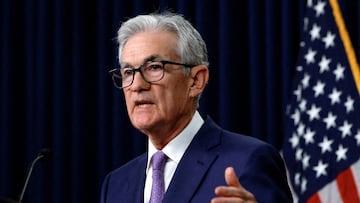Interest rates may fall by September according to experts: How could it affect your monthly budget?
Interest rates could begin to fall by the end of the summer, but exactly how that monetary policy decision will impact households reveals a complicated relationship between rates and the economic well-being of families.


The Federal Funds rate (FFR) is set by the Federal Reserve Bank of the United States and represents the rate offered by the lender of the last return in the country. From this rate, other lenders adjust them, typically upwards, to limit their risk when providing loans. For example, as the FFR has increased, so have interest rates tacked onto mortgages. Higher mortgage rates mean that the demand for such loans falls as potential buyers are priced out of the market when the cost of their mortgage exceeds their budget.
In June, the Federal Reserve’s Free Open Market Committee (FOMC) released its forecasts for the next three years. These projections show that the median for 2024 for the FFR will be 5.1 percent. Currently, the effective FFR stands at 5.33 percent, meaning that the Fed expects to lower rates by the end of the year.
When is the next FOMC meeting?
The Fed’s FOMC is set to meet next week and will announce any changes to the FFR on Wednesday, July 31.
A poll of economists published by The Wall Street Journal in early July found that the vast majority believed that the Fed would lower rates by the end of the year. However, the current trackers show that over 90 percent of economists surveyed expect the Fed to hold rates constant at their meeting. For most, the pace at which prices have come down is insufficient to warrant bringing rates down.
This does not mean that by September, rates will not have been lowered by the Fed. And while lower mortgage rates, or lower interest rates on loans in general, could increase money flowing through the economy, the benefits for households may take longer to materialize.
How monetary policy can affect unemployment
Economist William C. Dudley published an op-ed in Bloomberg this week, calling on the Fed to lower rates, arguing that increases in unemployment as inflation has come down is a sign that rates should be lowered. The effect monetary policy has on unemployment is one of the most direct effects the movement of interest rates has on household budgets. In Dudley’s piece, he highlights concerning trends in the labor market that he believes should prompt action from the central bank. If unemployment begins to increase any faster, it could signal a recession is on the horizon, noting that the 0.43 percent bump in the national rate should signal trouble.
Former New York Fed President Bill Dudley has long been in the “higher for longer” camp on interest rates.
— Bloomberg Opinion (@opinion) July 25, 2024
But he’s changed his mind. Here’s why he thinks the Fed should cut rates next week 🎥 pic.twitter.com/NSaxS56vhQ
Additionally, Dudley, who served as the President of the Federal Reserve Bank of New York, pointed out that while the Fed has paid little mind to changes in unemployment, it remains under a dual mandate. That mandate requires the central bank to balance price stabilization efforts while ensuring the labor market remains robust and as close to full employment (i.e., all those who want a job have one) as possible.
Related stories
Similar arguments have been heard from leaders on Capital Hill, including Massachusetts Senator Elizabeth Warren, who, like Dudley, is concerned that once the economy begins shedding jobs, it is a difficult process to stop. Historically, rapid increases in unemployment are associated with recession, as households grow concerned that their job could be cut and begin to save more, further slowing the movement of money through the economy.
The Fed hiked interest rates to the highest level in 20 years. Now, rents and mortgages are going up and housing is out of reach for many families.
— Elizabeth Warren (@SenWarren) February 9, 2024
Enough is enough. It’s time for the Fed to cut interest rates. pic.twitter.com/5u233hmUe6
The July Employment Report, which will be released on Friday, will help us evaluate how higher rates have affected the labor market. According to the projections released by the Federal Reserve, the officials expect the median unemployment rate for 2024 to be around 4 percent, rising to 4.2 percent next year.
Complete your personal details to comment